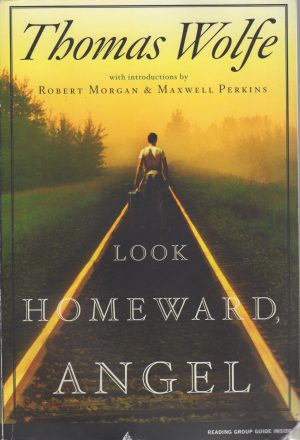
Look Homeward, Angel by Thomas Wolfe (2006. Scribner. ISBN 9780743297318)
Time for a confession. I have always confused the Thomas Wolfe, renowned contemporary of Hemingway, Faulkner, and Stein with the other Tom Wolfe (Bonfire of the Vanities) who was born seven years before the author of Look Homeward, Angel died of miliary tuberculosis of the brain. OK. So I admit I’m no literary scholar. Cut me some slack already. Still, I love to read and having never read either Wolfe, I thought I’d start with the more senior of the pairing. I wasn’t disappointed.
Eugene Gant, the troubled, talented, confused young protagonist of a family saga entwined with Gene’s “coming-of-age” revelations, is a character that all readers, regardless of gender or upbringing, must eventually come to love. Precocious, intelligent, curious, and adventurous, young Eugene reminds me in some ways of another young man in another coming-of-age novel, Holden Caulfield. The difference between Wolfe’s take on the genre and Salinger’s is not just the depth and weight of the family saga that Wolfe uses to backstop Gene Gant’s journey to adulthood; it is the complexity of the language Wolfe infuses into the story, a choice that is at equal measure frustrating for its winding, digressing, and meandering style, and one distinctly at odds with the reclusive Salinger’s simplified prose. Perhaps the difficulty of tracking the arc of Look Homeward, Angel‘s storyline in and around Wolfe’s sweeping and soaring wordsmithing is why nearly every high school student in America has read Catcher in the Rye but far fewer have delved into this thick volume of Southern musings, anecdotes, and twisted familial disasters.
Though set in the mythical town of Altamount, North Carolina (loosely based on Wolfe’s ancestral home of Asheville), clearly written in the languid and internally conflicted style of other Southern writers (Faulkner, O’Connor, and Welty come to mind), and deeply rooted in place as the overriding character looming behind the story, Wolfe’s take on family and maturation is universal and deserving of closer scrutiny and a larger following. And yet, the difficulty of his craftsmanship, the author’s incessant need to digress and add countless cultural, literary, and regional asides to the narrative, is likely one reason why Wolfe is not studied nor read with the same width and depth that his aforementioned Depression era contemporaries seem to be. But once the reader comes to appreciate the cadence to Wolfe’s elegant prose, the saga of Oliver and Eliza Gant and their expansive brood of little Gants (including Eliza’s favorite child, Eugene) this book truly is a transformative read. Here’s a sample of what I am talking about:
Oliver had about twelve hundred dollars, saved from the wreckage of Cynthia’s estate. During the winter he rented a little shack at one edge of the town’s public square, acquired a small stock of marbles, and set up business. But he had little to do at first save to think of the prospect of his death.
There. That short passage says much, in a mere three sentences, of the inner demons afflicting the hard drinking patriarch of the Gant family. And such wonderful exposition of soul is only the beginning.
4 and 1/2 out of 5 stars. An American classic.
Peace.
Mark


